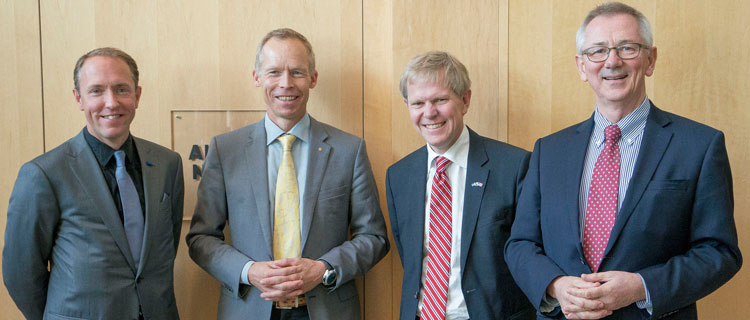
Sustainable prosperity
Creating a win-win situation
Centre and WRI in dialogue on spurring action for prosperity within planetary boundaries
The centre in close collaboration with World Recourses Institute (WRI) and the Swedish Embassy in Washington D.C., hosted in October 2013 a high-level discussion for leaders in business, policy, science and civil society. Entitled Human Prosperity within Planetary Boundaries, the purpose of the discussion was to explore ways to meet the challenges of navigating both economic and human development in a growing, more prosperous world, within a safe operating space for humanity.
Speakers at the event included centre director Johan Rockström, WRI President Andrew Steer and Björn Lyrvall, Ambassador of the Embassy of Sweden to Washington D.C.
The event attracted about a hundred leaders from organizations such as NASA Headquarters, World Bank, Ashoka, GEF, U.S. Department of State, Omidyar Network, Statoil, U.S. EPA, UNEP, Georgetown University etc.
A human quest
The discussion departed from the challenges that accompany an increasingly prosperous world, committed to reach nine billion inhabitants, where all have the right to energy, food and fresh water. This development has to come about without jeopardizing the planetary foundations, not merely for the sake of nature itself, but for the sake of future economic and human development.
Together with National Geographic fotographer and centre fellow Mattias Klum, Johan Rockström presented evidence that a new human paradigm for development is not only necessary, but also desirable and possible. The presentation was based on the narrative from their book The Human Quest – Prosperity within Planetary Boundaries, which combines latest scientific insights with stunning images of nature.
"Nature is not something we just ethically protect," said Rockström. "It makes sense to protect it for our own well-being."
A win-winsituation
The Planetary Boundaries framework and resilience thinking was at the core of the discussions on how to create a stewardship that reconnects our biosphere to our societies. The emphasis was, not least, also on how to turn info to action, seize win-win opportunities and shape policy to incentivize innovation.
WRI CEO and President Andrew Steer also provided concrete examples of ways to build prosperity in a changing world. Creative, forward-thinking policies can induce the technological changes we need to live within our planetary boundaries, he said. Steer pointed to the sharp decline in solar photovoltaics in recent years.
A combination of national policies—like renewable energy targets and investment in R&D—and market forces have encouraged the development of wind and solar energy production. As the technology has evolved, solar prices have dropped, helping spread this technology and offering consumers a low-cost energy option. These policies can also drive economic opportunities—a "win-win" for society and the environment.






